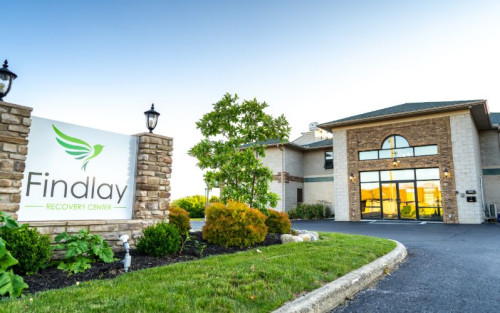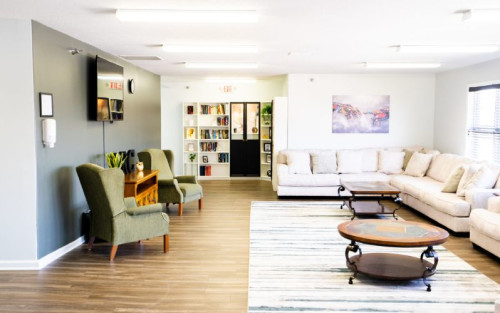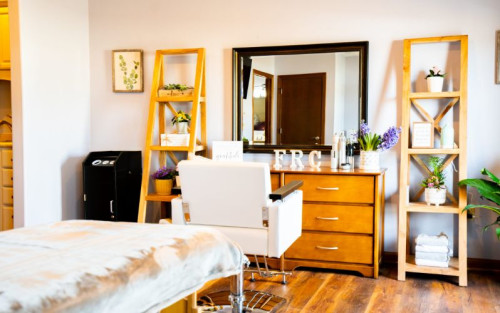






Findlay Recovery Center
Verified Center
This provider's information has been quality-checked by Recovery.com's Research Team for accuracy and completeness, including center verification through appropriate third-party organizations.
Treatment Focus
This center treats substance use disorders and co-occurring mental health conditions. Your treatment plan addresses each condition at once with personalized, compassionate care for comprehensive healing.
Primary Level of Care
Offering intensive care with 24/7 monitoring, residential treatment is typically 30 days and can cover multiple levels of care. Length can range from 14 to 90 days typically.
Treatment Focus
This center treats substance use disorders and co-occurring mental health conditions. Your treatment plan addresses each condition at once with personalized, compassionate care for comprehensive healing.
Primary Level of Care
Offering intensive care with 24/7 monitoring, residential treatment is typically 30 days and can cover multiple levels of care. Length can range from 14 to 90 days typically.
Provider's Policy
Findlay Recovery Center works with most major insurance carriers to help cover most of the costs associated with addiction treatment. Find out now if your benefits will cover our program.
Findlay Recovery Center
Findlay Recovery Center
About Findlay Recovery Center
Findlay Recovery Center’s modern campus provides clients with a home-away-from-home while they recover from the disease of addiction. Findlay Recovery Center has everything clients may need to find lasting, sustainable recovery from drug and alcohol use, including in-depth family programming, gender-specific groups, and dual-diagnosis care. Their dedicated team of addiction professionals has over 30+ years of combined treatment experience, which helps clients trust in their expertise and in their genuine compassion.
Personalized Care
Findlay Recovery believes in providing personalized solutions for addiction by creating hand-crafted treatment plans specific to the unique needs of each client. Instead of a one-size-fits-all approach, this allows Findlay to address the root cause of addiction in a way that's best for each client.
Safe, Clinically Monitored Detox
Findlay Recovery seeks to make detoxing from addictive substances as comfortable as possible, with clients’ safety being their top concern. Medical monitoring and assistive medications ease discomfort and provide a level of safety clients can trust in. Findlay’s comfortable rooms and clinical expertise help make the first step into recovery as easy and brief as possible.
Convenient And Comfortable Location
Nestled in the heart of Findlay, Ohio, their program provides the perfect escape for those seeking recovery from substance use. Just a few short hours from most major metropolitan areas in Ohio, Findlay Recovery offers individualized, luxury treatment at an affordable rate. From modern furnishings to private bathrooms, and delicious gourmet food, Findlay Recovery Center provides everything clients need to obtain long-lasting recovery.

Highlights from the Center
Highlights
These highlights are provided by and paid for by the center.
Insurance Accepted
Joint Commission Accredited
Customized Treatment Plans
On-site Medical Detox
Center Overview
Treatment Focus
This center treats substance use disorders and co-occurring mental health conditions. Your treatment plan addresses each condition at once with personalized, compassionate care for comprehensive healing.
Joint Commission Accredited
The Joint Commission accreditation is a voluntary, objective process that evaluates and accredits healthcare organizations (like treatment centers) based on performance standards designed to improve quality and safety for patients. To be accredited means the treatment center has been found to meet the Commission's standards for quality and safety in patient care.

Insurance Accepted
Cash Pay Rates
Estimated Cash Pay Rate
Center pricing can vary based on program and length of stay. Contact the center for more information. Recovery.com strives for price transparency so you can make an informed decision.
Meet Your Care Team

Sarah Shaferly
Executive Director

Cassandra Bengela
Clinical Director
LPCC

Shawn Clark
Director of Nursing
RN

Monica Scharp
Primary Therapist




Levels of Care






Your Care Options
Specializations
Alcohol
Using alcohol as a coping mechanism, or drinking excessively throughout the week, signals an alcohol use disorder.
Co-Occurring Disorders
A person with multiple mental health diagnoses, such as addiction and depression, has co-occurring disorders also called dual diagnosis.
Trauma
Some traumatic events are so disturbing that they cause long-term mental health problems. Those ongoing issues can also be referred to as "trauma."
Who We Treat
Young Adults
Emerging adults ages 18-25 receive treatment catered to the unique challenges of early adulthood, like college, risky behaviors, and vocational struggles.
Approaches
Spiritual Emphasis
Spirituality connects patients to a higher power and helps strengthen their recovery, hope, and compliance with other treatment modalities.
Evidence-Based
A combination of scientifically rooted therapies and treatments make up evidence-based care, defined by their measured and proven results.
Experiential
Expressive tools and therapies help patients process past situations, learn more about themselves, and find healing through action.
Family Involvement
Providers involve family in the treatment of their loved one through family therapy, visits, or both–because addiction is a family disease.
Holistic
A non-medicinal, wellness-focused approach that aims to align the mind, body, and spirit for deep and lasting healing.
Individual Treatment
Individual care meets the needs of each patient, using personalized treatment to provide them the most relevant care and greatest chance of success.
Medical
Medical addiction treatment uses approved medications to manage withdrawals and cravings, and to treat contributing mental health conditions.
Non 12 Step
Non-12-Step philosophies veer from the spiritual focus of the 12-Steps and instead treat the disease of addiction with holistic or secular modalities.
Personalized Treatment
The specific needs, histories, and conditions of individual patients receive personalized, highly relevant care throughout their recovery journey.
Therapies
1-on-1 Counseling
Patient and therapist meet 1-on-1 to work through difficult emotions and behavioral challenges in a personal, private setting.
Rational Emotive Behavior Therapy
A type of cognitive therapy that identifies negative self-defeating thoughts and behaviors, rewriting beliefs to be positive, empowering, and present.
Mindfulness Therapy
This ancient practice can be mental, emotional, and even spiritual. In meditation, you focus your attention on the present moment without judgement.
Adventure Therapy
This experiential approach uses the physical and emotional challenges of outdoor activities as tools for personal growth.
Art Therapy
Visual art invites patients to examine the emotions within their work, focusing on the process of creativity and its gentle therapeutic power.
Couples Counseling
Partners work to improve their communication patterns, using advice from their therapist to better their relationship and make healthy changes.
Dance Therapy
This experiential therapy uses dance to improve body awareness, physical health, and social skills.
Conditions We Treat
Anxiety
Anxiety is a common mental health condition that can include excessive worry, panic attacks, physical tension, and increased blood pressure.
Codependency
Codependency is a pattern of emotional dependence and controlling behavior. It's most common among people with addicted loved ones.
Depression
Symptoms of depression may include fatigue, a sense of numbness, and loss of interest in activities. This condition can range from mild to severe.
Post Traumatic Stress Disorder
PTSD is a long-term mental health issue caused by a disturbing event or events. Symptoms include anxiety, dissociation, flashbacks, and intrusive thoughts.
Trauma
Some traumatic events are so disturbing that they cause long-term mental health problems. Those ongoing issues can also be referred to as "trauma."
Substances We Treat
Alcohol
Using alcohol as a coping mechanism, or drinking excessively throughout the week, signals an alcohol use disorder.
Benzodiazepines
Benzodiazepines are prescribed to treat anxiety and sleep issues. They are highly habit forming, and their abuse can cause mood changes and poor judgement.
Chronic Relapse
Consistent relapse occurs repeatedly, after partial recovery from addiction. This condition requires long-term treatment.
Co-Occurring Disorders
A person with multiple mental health diagnoses, such as addiction and depression, has co-occurring disorders also called dual diagnosis.
Cocaine
Cocaine is a stimulant with euphoric effects. Agitation, muscle ticks, psychosis, and heart issues are common symptoms of cocaine abuse.
Drug Addiction
Drug addiction is the excessive and repetitive use of substances, despite harmful consequences to a person's life, health, and relationships.
Ecstasy
Ecstasy is a stimulant that causes intense euphoria and heightened awareness. Abuse of this drug can trigger depression, insomnia, and memory problems.
Heroin
Heroin is a highly addictive and illegal opioid. It can cause insomnia, collapsed veins, heart issues, and additional mental health issues.
Languages
Aftercare
Care Designed for Your Needs
Personal Amenities
Amenities
Special Considerations
Center Pets
Addiction and mental health facilities with pets allow patients to interact with friendly dogs, cats, horses, and in some cases, even dolphins.
Flexible technology policies
Centers with flexible technology policies allow professionals to stay in touch with work and give patients a greater sense of connection and normalcy.
Gender-specific groups
Patients in gender-specific groups gain the opportunity to discuss challenges unique to their gender in a comfortable, safe setting conducive to healing.
Activities
Off-Site Activities
Yoga
Yoga is both a physical and spiritual practice. It includes a flow of movement, breathing techniques, and meditation.

What people are saying
Treatment
5.0
Accommodations
4.9
Food & Nutrition
4.9
Value
5.0
Pros
- Treated With Respect (22)
- Friendly & Competent Staff (21)
- Supportive Aftercare (20)
- Straightforward Costs & Expectations (20)
LB
Treatment in 2022 • (7 days) • Reviewed 10/03/22
Former Client
•N/a
•Columbus ohio
Devin
Treatment in 2022 • (14 days) • Reviewed 11/23/22
Former Client
•UPS
•Bolivar,NY
Chelsea B.
Treatment in 2022 • (30 days) • Reviewed 09/29/22
Former Client
•Mother
•Indianapolis, IN
Cooper Norman
Treatment in 2022 • (30 days) • Reviewed 11/10/22
Former Client
•Restaurant
•Findlay
Darcy
Treatment in 2022 • (14 days) • Reviewed 11/10/22
Former Client
•Homemaker
•Oregon





